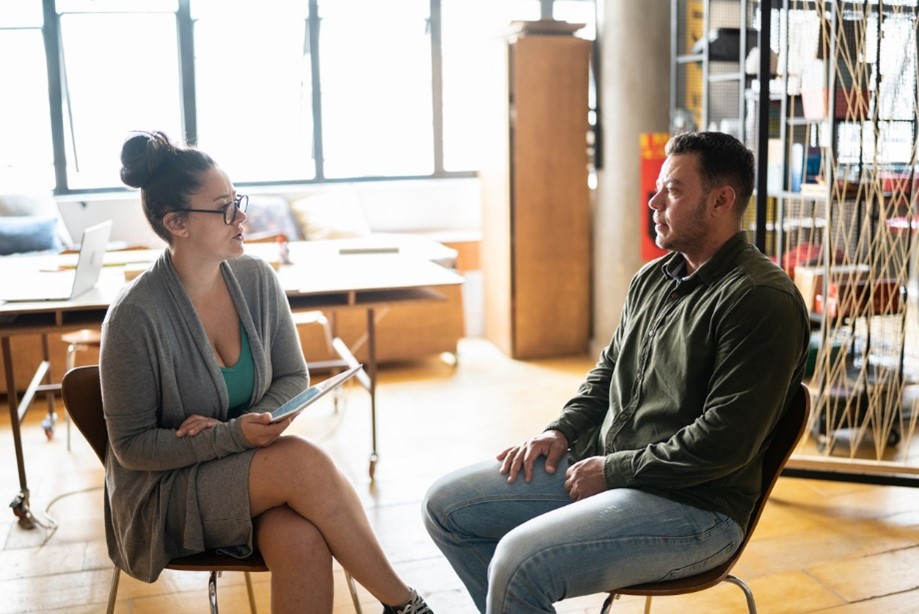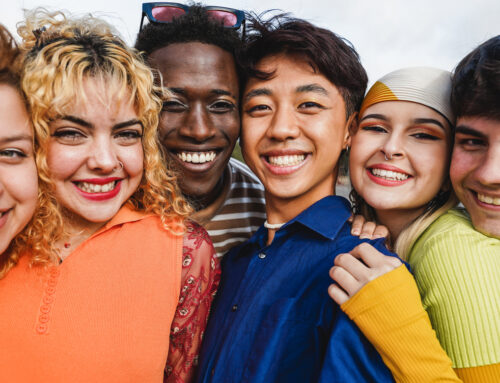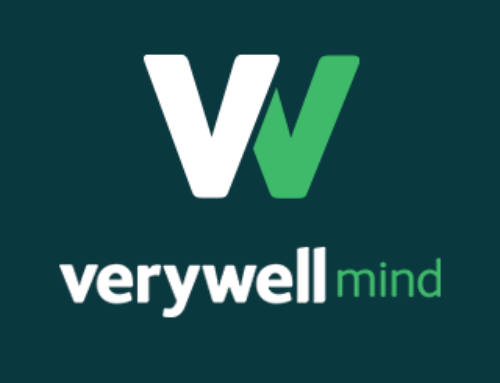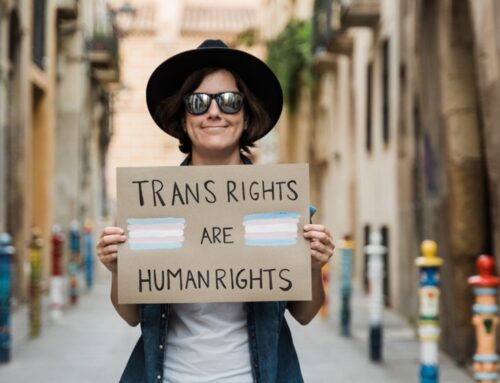The following eating disorder post is a personal account by a former Walden patient. At Walden, we are honored to share recovery stories by including occasional guest blog submissions.
What would you say to someone who may be struggling with an eating disorder and who is part of marginalized cultural groups?
Find Community
Find community — in whatever way is most comfortable, safe and accessible for you. No matter if it’s in-person with friends, at a local queer coffee shop, online as a support group, or in the posts of affirming social media spaces, finding people who hold the similar identities is one of the biggest ways to knock out the disconnection where eating disorders thrive.
When I’m surrounded by folks in recovery who are like me (or even folks who are recovery-oriented but not in recovery themselves), I can see and feel that I am not alone.
Be Your Own Advocate
Advocate for your needs to the best of your ability. This might be writing down important notes and questions ahead of an intake, asking someone you trust to talk to a provider for/with you, calling your insurance companies about claims, and researching to find the best treatment available to you.
There have been times in my treatment journey that it felt easier to quit than move forward due to the effort involved with accessing treatment and finding the right people. However, pushing through those tough moments – whether it be with insurance companies, individual providers, or organizations – is why I’m where I’m at today.
Social Media Audit
Assess the social media content you regularly access. Are you viewing posts from people and organizations that uplift you? If not, go find some!
Even when I’m low on social energy, reading and watching videos with positive underlying messaging has been a valuable way for me to individually connect with others and has brought a lot of joy to my screens. I have discovered countless accounts celebrating people in all kinds of bodies, and it’s refreshing and empowering to see people like me who are doing well and living recovery-oriented lives.
What are some tips for finding affirming providers?
Ask the right people for recommendations
Ask people you trust for recommendations when looking for a new provider and/or treatment program.
All the clinicians I currently see are people I found by asking for personal recommendations. I’ve asked friends, family, community organizations, current clinicians, and former clinicians if they know of anyone who would be a good fit.
Whether in-person, on a social media post, or via email, I typically ask if they are aware of the type of provider/program (i.e. registered dietician) who is trans-friendly and has experience working with eating disorders.
The best recommendations I’ve received have come from providers who have worked with me for some time, know me well, and then either provide a recommendation or ask their professional network for ideas and get back to me.
Look for what is and isn’t stated
When you find a provider or program you’re interested in, do some research online and see if they look promising.
When I search online, I look to see if pronouns are listed anywhere (this is often optional to post), bios of experience and interests, and published research or other written content. If anything conflicts with what I need to heal, I move on and look elsewhere.
Evaluate the costs
Evaluate the costs associated with engaging in treatment by contacting your insurance company or the provider to confirm they participate with your plan and what costs you can expect to incur.
Schedule a consultation
Reach out, see if they are accepting new clients, and schedule either a consultation evaluation for the program or a first session.
Keep in mind that it may take a few tries with different people before you find a clinician who feels like a good fit for you. This can be frustrating and at times discouraging, but please know that it’s truly worth it to keep trying until you find what you’re looking for. I typically will complete at least two sessions with a new provider before deciding that they aren’t a good fit unless something harmful comes up in my first interaction.
If a provider or program falls into the middle area of not being harmful but also not being an ideal match, it may be best to try treatment with them until you have established care with a better option. I personally know my eating disorder thrives when I become disconnected from care for longer periods of time.
Good signs that I look for at this point in the process include:
- Someone who asks about experiences rather than making broad assumptions
- Use of gender-neutral / gender-inclusive language in conversations, forms and policies
- Incorporation of chosen family into treatment
- Foundation of knowledge about racism and white supremacy and how this shows up in past and current lived experiences for clients
- Gender inclusive restrooms (and rooming in residential)
- Physical markers within spaces (flags, pins, artwork, pronouns on name tags)
- Seating that fits variations in body sizes and abilities
- Adapting treatment based on individual needs
Don’t give up!
I cannot tell you how many people and programs I have researched, contacted, and screened during my own treatment history. If I hadn’t stayed persistent, I wouldn’t be where I am today with my recovery. It can be exhausting but keep pushing forward.
What should providers know when treating folx in the LGBTQ+ community that would make for a better experience in treatment?
- Putting in the time and effort to educate yourself on LGBTQ+ identities make a difference in care. Having to educate a provider on the very basics of someone’s LGBTQ+ identity(s) takes time away from the central purpose of treatment. When a clinician has a foundational knowledge of queer and trans identities, it means I can spend less time explaining (and sometimes defending) who I am, and more time diving into how my identities and disorders intersect.
- Everyone within the LGBTQ+ community is beautifully unique, and no two people are the same, even if they identify with the same labels.
- Understand that self-discovery is not attached to any sort of timeline. Some people know who they are at a young age, and others might not know until much later in life.
- Coming out is never required and should NEVER be forced or carried out without consent. This applies to disclosing sexuality, gender identity, new pronouns and/or new chosen names. It should always be the person’s choice to disclose or not disclose any of this information, to anyone, for any reason.
- There are an incredible number of factors to consider when disclosing sexuality and/or gender divergence to others. Safety should be a part of the conversation, not only physical safety, but also emotional, financial, and social. This is especially true for folx who are dependent on others for the majority of their resources (i.e. food and housing).
- If someone comes out to you as a provider, please ask that person who else knows and if this information is public knowledge. For example, if a trans person shares that they are genderqueer and are using a new name and new pronouns, the client should be asked if it’s okay for this information to be used and included in a variety of situations including in their chart, when speaking to other providers, during phone calls, and in mailed letters, etc.
- Identities are fluid, can change over time, and that is okay.
- Anyone who is experiencing gender dysphoria may require a different approach to treatment when body dysmorphia is present.
- Encourage clients to access free peer and/or professional support groups for queer and/or trans folx with eating disorders, or any community groups for LGBTQ+ folx.
- Educate yourself about the health disparities that exist with the community (i.e. trans folx experience higher rates of eating disorders, substance use, etc.)
Learn more about Rainbow Road – Virtual Eating Disorder Treatment for LGBTQIA+ clients from LGBTQ+ providers.
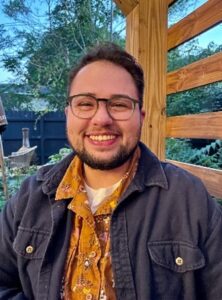 Michael (they/them) resides in western New York with their partner, dog and cat, and finds peace among trees. They feel compelled to share their life story with others and provide education about how intersecting identities impact wellness and recovery. It’s important to Michael to share that white privilege has influenced their experiences and ability to access care. Michael has a bachelor’s degree in public health and a strong passion for working with the LGBTQ+ community. Their goal in the future is to support people in recovery by helping strengthen skills relating to cooking and preparing food.
Michael (they/them) resides in western New York with their partner, dog and cat, and finds peace among trees. They feel compelled to share their life story with others and provide education about how intersecting identities impact wellness and recovery. It’s important to Michael to share that white privilege has influenced their experiences and ability to access care. Michael has a bachelor’s degree in public health and a strong passion for working with the LGBTQ+ community. Their goal in the future is to support people in recovery by helping strengthen skills relating to cooking and preparing food.


